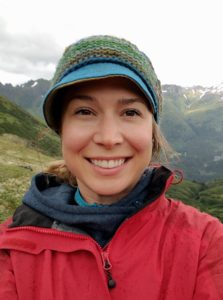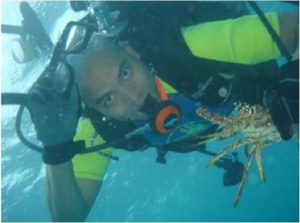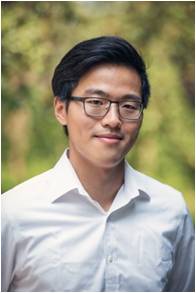The Executive Committee recently updated the bylaws of the WDAFS. Among other changes, the Student Representative was made a voting member of the Executive Committee. In addition, the length of time served by the Student Representative was changed from one to (optionally) two years. The Executive Committee deemed these changes necessary for the Student Representative to more effectively participate in WDAFS activities.
From May 18 to June 18, Western Division student members will be able to vote electronically for one of three Student Representative candidates. Britta Baechler is seeking reelection, and Courtney Pegus and Yangfan Zhang have also thrown their hat in the ring. No matter who wins the election, WDAFS will be well-served. Their candidate statements can be found below. Please note that only student members may vote in this election.
To vote, please visit: 2018 Student Representative Election
Britta Baechler
 Britta is the incumbent Student Representative, and has been serving since August 2017. She is seeking re-election so she can continue to liaise between student members and the WDAFS Executive Committee, and further improve communication among student subunits. Britta grew up in the small coastal fishing town of Homer, Alaska, where she enjoyed a great deal of time outdoors in and around the water. She began her career in fisheries management as a junior in high school as an American Fisheries Society Hutton Junior Fisheries Biology Program scholar, and was instantly hooked! As an undergraduate pursuing a B.A. in Biology at Lewis & Clark College in Portland, Oregon, Britta spent her summers working for the Alaska Department of Fish and Game, the National Oceanic and Atmospheric Administration, and Oregon Department of Fish and Wildlife. Since obtaining her undergraduate degree, Britta has worked as a shellfish fishery biologist and fishery manager in the remote Bering Sea and Aleutian Islands region of Alaska, as well as a Coral Reef Management Fellow and Marine Protected Area Coordinator in the tropical U.S. territory of the Commonwealth of the Northern Mariana Islands. Currently, Britta is pursuing a PhD in Environmental Science and Management at Portland State University. Her work in the Applied Coastal Ecology lab aims to determine concentrations of microplastics in Pacific Northwest razor clams and cultured Pacific oysters.
Britta is the incumbent Student Representative, and has been serving since August 2017. She is seeking re-election so she can continue to liaise between student members and the WDAFS Executive Committee, and further improve communication among student subunits. Britta grew up in the small coastal fishing town of Homer, Alaska, where she enjoyed a great deal of time outdoors in and around the water. She began her career in fisheries management as a junior in high school as an American Fisheries Society Hutton Junior Fisheries Biology Program scholar, and was instantly hooked! As an undergraduate pursuing a B.A. in Biology at Lewis & Clark College in Portland, Oregon, Britta spent her summers working for the Alaska Department of Fish and Game, the National Oceanic and Atmospheric Administration, and Oregon Department of Fish and Wildlife. Since obtaining her undergraduate degree, Britta has worked as a shellfish fishery biologist and fishery manager in the remote Bering Sea and Aleutian Islands region of Alaska, as well as a Coral Reef Management Fellow and Marine Protected Area Coordinator in the tropical U.S. territory of the Commonwealth of the Northern Mariana Islands. Currently, Britta is pursuing a PhD in Environmental Science and Management at Portland State University. Her work in the Applied Coastal Ecology lab aims to determine concentrations of microplastics in Pacific Northwest razor clams and cultured Pacific oysters.
Courtney Pegus
 Statement of Interest
Statement of Interest
My name is Courtney Pegus or “Court” for short, and I am asking for your consideration of having me as the next Student Representative to the Western Division American Fisheries Society (WDAFS).
Why select me?
My passions, life pursuits, and career goals are strongly aligned with the mission statement of the WDAFS. I am most fulfilled when I am engaged in activities and organizations that promote conservation of marine environments through scientific research and discovery. I have attended several annual meetings hosted by the WDAFS and feel that the society provides valuable opportunities to network and collaborate. However, as a student representative I see a niche that I can contribute to further develop the mission of the WDAFS. The ecological and environmental problems that plague marine environments worldwide are vast and diverse and therefore as a society we need to be inclusive of diverse groups participating in science. Finding balance between Indigenous science and Western science as well as encouraging diversity in marine research will be key to solving these 21st century problems. My niche will be to promote diversity in student participation and projects. I realize that there are many scientists who belong to our network who will be interested in mentoring students who may not have opportunities that the more affluent students are privy to and if selected I will work towards establishing those connections. Additionally, many Indigenous students are more receptive to place-based learning opportunities and this will be an excellent avenue to include Indigenous knowledge with Western science. As such. I am interested in developing opportunities for researchers to include an Indigenous component when introducing students to field techniques by making learning materials readily available. I am a firm believer that we can make this a reality through the networking and financial resources at the WDAFS. I seek to reduce and eventually eliminate the disenfranchisement of minorities in marine conservation and research and if nominated I intend to collaborate with other members within the WDAFS to make progress in that direction.
Personal Bio:
I have always been fascinated by marine science and wanted to study the ocean and everything that lived on in and under its majestic blue blanket from a very early age. However, coming from very poor and underprivileged surroundings it was difficult to follow the traditional academic path. My personal mantra “where there is a will there is a way” was the phrase that steered me through several social, financial and academic obstacles. In essence, I was a financially poor, non-linear learner who was passionate about science but felt estranged by the teaching styles that were prevalent in traditional academic intuitions. I felt “pushed out” and separated from my love for science and had to devise a way to teach myself the basic scientific concepts in a way that I could understand. For this reason, I became dedicated to providing a pathway of scientific discovery for other disenfranchised students. Science should be exciting and available to all who are interested and not just for the privileged. I started many outreach activities during my masters program to encourage minorities in science (https://www.academia.edu/3308122/Public_outreach_to_expose_minorities_to_marine_science_Courtney_Pegus_science_extravaganza_) and have continued this effort during my doctoral studies which I am currently pursuing in fisheries at the University of Alaska Fairbanks. Since a picture is worth a thousand words: here is a recent video I made with my advisor to document effective ways of including Western science with Indigenous knowledge https://www.youtube.com/watch?v=Mg-BJJYMfME.
Thank you for your consideration.
Yangfan Zhang
 I am a Ph.D. student in Applied Animal Biology University of British Columbia (UBC), studying cardiorespiratory physiology in fish. I am running for Student Representative of Western Division American Fishery Society (WDAFS) for the year 2018-2019. I have been volunteering in WDAFS over the past two years as a communication officer in British Columbia Student Subunit and a member of the early professional committee in AFS.
I am a Ph.D. student in Applied Animal Biology University of British Columbia (UBC), studying cardiorespiratory physiology in fish. I am running for Student Representative of Western Division American Fishery Society (WDAFS) for the year 2018-2019. I have been volunteering in WDAFS over the past two years as a communication officer in British Columbia Student Subunit and a member of the early professional committee in AFS.
I have broadly and deeply been involved in positions of student leadership in departmental, university, and professional fields. I am the Chair of the Graduate Student Representatives in the Faculty of Science, Councillor of Graduate Council in the Graduate Student Society, and a graduate student councillor sitting on the Graduate Scholarship Committee UBC. I am a treasurer in the Zoology Graduate Student Association. I have organized and chaired sessions in graduate research conferences in UBC.
Except the roles in student leaderships, I have published peer-reviewed journal articles in Aquatic Toxicology, Aquaculture and Journal of Fish Biology as the first listed author. I have also published 3 invited commentary articles in Journal of Experimental Biology and 1 report in Canadian Aquaculture R&D review 2017. Some of my research work is featured in my interview in ReachOut magazine and radio interview in CiRT News 101. I am the recipient of Elizabeth R. Howland Fellowship and a short-listed candidate for Vanier Canada Graduate Scholarship.
This year, I would like to contribute my leadership experiences to enrich graduate student life in our society. I am strongly committed to furthering the mission of AFS by increasing opportunities for student engagement and ensuring that students enjoy the full benefits of AFS membership. I welcome you to vote for me.

